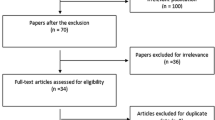Abstract
The Peptidyl arginine deiminase, type IV (PADI4) gene has been suggested to have an association with rheumatoid arthritis (RA) in several populations. But its role in Chinese RA is not clarified. We investigated five single-nucleotide polymorphisms (SNPs) of PADI4 as PADI4-89 (rs11203366), PADI4-90 (rs11203367), PADI4-92 (rs874881) PADI4-94 (rs2240340), and PADI4-104 (rs1748033) in Chinese Han population. A total of 378 unrelated RA patients and 204 healthy controls were genotyped for the five SNPs. Individual allele, genotype and haplotype frequencies were compared between patients and controls. No significant differences in the frequency of PADI4 alleles, genotypes and haplotypes were observed between the patients and controls except PADI4-92. These data indicated that PADI4 polymorphisms were unlikely to play an important role in the susceptibility to RA in Chinese Han population.
Similar content being viewed by others
References
Harris ED Jr (1990) Rheumatoid arthritis: pathophysiology and implications for therapy. N Engl J Med 322:1277–1289
Seldin MF, Amos CI, Ward R, Gregersen PK (1999) The genetics revolution and the assault on rheumatoid arthritis. Arthritis Rheum 42:1071–1079
The Wellcome Trust Case Control Consortium (2007) Genome-wide association study of 14,000 cases of seven common diseases and 3,000 shared controls. Nature 447:661–678
Cornelis F, Faure S, Martinez M et al (1998) New susceptibility locus for rheumatoid arthritis suggested by a genome-wide linkage study. Proc Natl Acad Sci USA 95:10746–10750
Shiozawa S, Hayashi S, Tsukamoto Y et al (1998) Identification of the gene loci that predispose to rheumatoid arthritis. Int Immunol 10:1891–1895
Wilcox MA, Li Z, Tapper W (2007) Genetic association with rheumatoid arthritis—Genetic Analysis Workshop 15: summary of contributions from Group 2. Genetic Epidemiol 31(S1):S12–S21
Kinloch A, Lundberg K, Wait R, Wegner N, Lim NH, Zendman AJ et al (2008) Synovial fluid is a site of citrullination of autoantigens in inflammatory arthritis. Arthritis Rheum 58:2287–2295
Chang X, Zhao Y, Sun S, Zhang Y, Zhu Y (2009) The expression of PADI4 in synovium of rheumatoid arthritis. Rheum Int 29(12):1411–1416
Rantapaa-Dahlqvist S, de Jong BA, Berglin E et al (2003) Antibodies against cyclic citrullinated peptide and IgA rheumatoid factor predict the development of rheumatoid arthritis. Arthritis Rheum 48:2741–2749
Vossenaar ER, Zendman AJ, van Venrooij WJ, Pruijn GJ (2003) PAD, a growing family of citrullinating enzymes: genes, features and involvement in disease. Bioessays 25:1106–1108
Suzuki A, Yamada R, Chang X, Tokuhiro S, Sawada T, Suzuki M et al (2003) Functional haplotypes of PADI4, encoding citrullinating enzyme peptidylarginine deiminase 4, are associated with rheumatoid arthritis. Nat Genet 34:395–402
Ikari K, Kuwahara M, Nakamura T, Momohara S, Hara M, Yamanaka H et al (2005) Association between PADI4 and rheumatoid arthritis: a replication study. Arthritis Rheum 52:3054–3057
Kang CP, Lee HS, Ju H, Cho H, Kang C, Bae SC (2006) A functional haplotype of the PADI4 gene associated with increased rheumatoid arthritis susceptibility in Koreans. Arthritis Rheum 54:90–96
Plenge RM, Padyukov L, Remmers EF, Purcell S, Lee AT, Karlson EW et al (2005) Replication of putative candidate-gene associations with rheumatoid arthritis in >4,000 samples from North America and Sweden: association of susceptibility with PTPN22, CTLA4, and PADI4. Am J Hum Genet 77:1044–1060
Arnett FC, Edworthy SM, Bloch DA, McShane DJ, Fries JF, Cooper NS et al (1988) The American Rheumatism Association 1987 revised criteria for the classification of rheumatoid arthritis. Arthritis Rheum 31:315–324
Chen R, Fang M, Cai Q, Duan S, Lv K, Cheng N et al (2007) Tumor necrosis factor alpha-308 polymorphism is associated with rheumatoid arthritis in Han population of Eastern China. Rheumatol Int 28(2):121–126
Cheng N, Cai Q, Fang M, Duan S, Lin J, Hu J et al (2009) No significant association between genetic polymorphisms in the TNAP gene and ankylosing spondylitis in the Chinese Han population. Rheumatol Int 29:305–310
Qin ZS, Niu T, Liu JS (2002) Partition-ligation-expectation-maximization algorithm for haplotype inference with single nucleotide polymorphisms. Am J Hum Genet 71:1242–1247
Fan LY, Wang WJ, Wang Q, Zong M, Yang L, Zhang H et al (2008) A functional haplotype and expression of the PADI4 gene associated with increased rheumatoid arthritis susceptibility in Chinese. Tissue Antigens 72(5):469–473
Rahman P (2007) Genetics of ankylosing spondylitis: an update. Curr Rheumatol 9:383–389
Harris ML, Darrah E, Lam GK, Bartlett SJ, Giles JT, Grant AV et al (2008) Association of autoimmunity to peptidyl arginine deiminase type 4 with genotype and disease severity in rheumatoid arthritis. Arthritis Rheum 58:1958–1967
Huang J, Li C, Xu H, Gu J (2008) Novel non-HLA-susceptible regions determined by meta-analysis of four genomewide scans for ankylosing spondylitis. J Genet 87:75–81
Harney SMJ, Meisel C, Sims AM, Woon PY, Wordsworth BP, Brown MA et al (2005) Genetic and genomic studies of PADI4 in rheumatoid arthritis. Rheumatology 44:869–872
Caponi L, Petit-Teixeira E, Sebbag M, Bongiorni F, Moscato S, Pratesi F et al (2005) A family based study shows no association between rheumatoid arthritis and the PADI4 gene in a white French population. Ann Rheum Dis 64:587–593
Martinez A, Valdivia A, Pascual-Salcedo D, Lamas JR, Fernández-Arquero M, Balsa A et al (2005) PADI4 polymorphisms are not associated with rheumatoid arthritis in the Spanish population. Rheumatology 10:1263–1266
Hoppe B, Häupl T, Gruber R, Kiesewetter H, Burmester GR, Salama A et al (2006) Detailed analysis of the variability of peptidylarginine deiminase type 4 in German patients with rheumatoid arthritis: a case–control study. Arthritis Res Ther 8:R34
Cordell HJ (2009) Genome-wide association studies: detecting gene-gene interactions that underlie human diseases. Nat Rev Genet 10:392–404
Brown MA (2008) Breakthroughs in genetic studies of ankylosing spondylitis. Rheumatology 47:132–137
Acknowledgments
We are very grateful to Professor Baohua Qian of Changhai Hospital for Providing Health Controls.
Author information
Authors and Affiliations
Corresponding author
Additional information
Ruiwen Chen, Yubao Wei and Qing Cai are co-first authors of this work.
Rights and permissions
About this article
Cite this article
Chen, R., Wei, Y., Cai, Q. et al. The PADI4 gene does not contribute to genetic susceptibility to rheumatoid arthritis in Chinese Han population. Rheumatol Int 31, 1631–1634 (2011). https://doi.org/10.1007/s00296-010-1519-x
Received:
Accepted:
Published:
Issue Date:
DOI: https://doi.org/10.1007/s00296-010-1519-x




